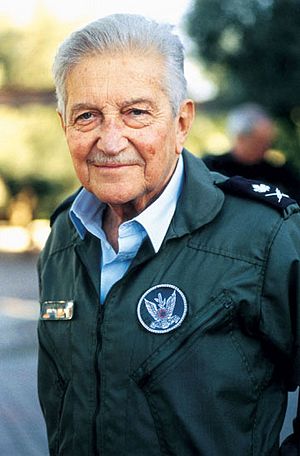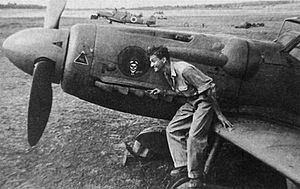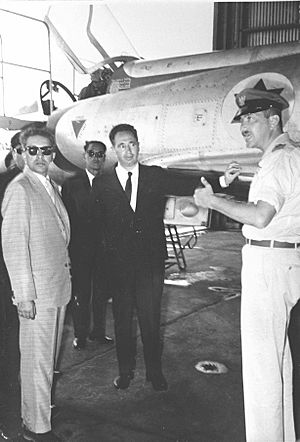Ezer Weizman facts for kids
Quick facts for kids
Ezer Weizman
|
|
|---|---|
|
עֵזֶר וַיצְמָן
|
|
 |
|
| 7th President of Israel | |
| In office 13 May 1993 – 13 July 2000 |
|
| Prime Minister | Yitzhak Rabin Shimon Peres Benjamin Netanyahu Ehud Barak |
| Preceded by | Chaim Herzog |
| Succeeded by | Moshe Katsav |
| Minister of Defense | |
| In office 20 June 1977 – 28 May 1980 |
|
| Prime Minister | Menachem Begin |
| Preceded by | Shimon Peres |
| Succeeded by | Menachem Begin |
| Personal details | |
| Born | 15 June 1924 Tel Aviv, Mandatory Palestine |
| Died | 24 April 2005 (aged 80) Caesarea, Israel |
| Nationality | Israeli |
| Political party | Independent (1965–1984) Yahad (1984–1991) Labor (1991–2005) |
| Other political affiliations |
Gahal (1965–1972) Likud (1976–1984) |
| Spouse |
Reuma Weizman
(m. 1950–2005) |
| Children | 2 |
| Profession | Military |
| Military career | |
| Allegiance | |
| Service/ |
|
| Years of service | 1942–1945 (UK) 1946–1969 (Israel) |
| Rank | Aluf (Major General) |
| Commands held | Chief of Operations on the General Staff Commander of Ramat David Commander of the Israeli Air Force Deputy Chief of the General Staff |
| Battles/wars | World War II 1947–1949 Palestine war Suez Crisis Six-Day War War of Attrition |
Ezer Weizman (15 June 1924 – 24 April 2005) was an important leader in Israel. He served as the seventh President of Israel. He was first elected in 1993 and then again in 1998. Before becoming president, Weizman was a commander in the Israeli Air Force. He also served as the Minister of Defense.
Contents
Early Life and Training
Ezer Weizman was born in Tel Aviv on 15 June 1924. This was when the area was known as the British Mandate of Palestine. His father was an expert in farming. Ezer Weizman was also the nephew of Chaim Weizmann, who became Israel's first president.
He grew up in the cities of Acre and Haifa. He later married Reuma Schwartz. They had two children, Shaul and Michal.
Weizman became a skilled pilot. He joined the British Army in 1942 during World War II. He first worked as a truck driver. In 1943, he joined the British Royal Air Force (RAF). He trained as a pilot in Rhodesia (now Zimbabwe). He served with the RAF in Egypt and India until 1945.
After his time in the RAF, he was part of the Irgun underground group in Mandatory Palestine. This group worked to establish a Jewish state.
A Leader in the Air Force


After Israel became a country in 1948, Weizman became a pilot for the Haganah. This was during the 1948 Arab–Israeli War. He commanded an air squadron. He learned to fly the Avia S-199 plane in Czechoslovakia. He took part in Israel's first fighter plane mission. This mission attacked an Egyptian army group.
Weizman joined the Israel Defense Forces (IDF). He became the Chief of Operations for the General Staff. He also attended a staff college in England. Later, he became the commander of the Ramat David Airbase.
From 1958 to 1966, Weizman led the Israeli Air Force. He then became the deputy Chief of the General Staff. In 1966, he helped an Iraqi fighter pilot defect with his advanced MiG plane. This gave Israel important information.
In 1967, he planned and led surprise air attacks against Egyptian air bases. These attacks were very successful. They destroyed most of the Egyptian Air Force in just three hours. This gave Israel control of the skies during the Six-Day War. About 400 enemy planes were destroyed on the first day. Weizman retired from the military in 1969.
Moving into Politics
After leaving the military, Weizman joined the Gahal political party. He became the Minister of Transportation. He served in this role until 1970. He later rejoined the party, which had become Likud.
In 1977, he became the Defense Minister. During his time, Israel developed a new fighter jet, the IAI Lavi. He also oversaw a military operation in southern Lebanon.
Weizman's views on peace began to change. After Egyptian President Anwar Sadat visited Jerusalem in 1977, Weizman became good friends with him. Weizman spoke Arabic, which helped their friendship. Sadat even called Weizman his "younger brother." These strong connections were very important. They helped lead to the 1978 Camp David Accords. These agreements then led to a peace treaty with Egypt.
In 1980, Weizman left the government. He started a new political party called Yahad in 1984. This party won three seats in the elections. Yahad joined a government that included both major parties. From 1984 to 1990, Weizman served as Minister for Arab Affairs. He then became the Minister of Science and Technology. In 1992, his party joined the Israeli Labor Party.
Serving as President
On 24 March 1993, the Knesset (Israel's parliament) chose Weizman to be the next president. He won with a majority of votes. He officially became president on 13 May 1993.
As president, Weizman worked hard to promote peace. In 1996, he invited Yasser Arafat to his home. In 1999, he met with Nayef Hawatmeh, a leader of the DFLP. Weizman said he would meet with anyone if it helped bring peace. He also supported giving up the Golan Heights for peace with Syria.
Towards the end of 1999, there were reports in newspapers. They said that Weizman had received money from businessmen before he became president. He had not reported this to the authorities. No charges were filed against him. However, because of the public discussion, he decided to resign. Weizman's resignation became official on 13 July 2000.
Later Life and Legacy
Ezer Weizman passed away on 24 April 2005, at the age of 80. He died at his home in Caesarea. He is buried in Or Akiva, next to his son and daughter-in-law. This is different from most Israeli presidents. They are usually buried on Mount Herzl.
Gallery
-
Ezer Weizman greeting King Hussein of Jordan
-
A meeting at Camp David with (l-r) Aharon Barak, Menachem Begin, Anwar Sadat, and Ezer Weizmann, 1978
Awards and Recognition
- 1996: Collar of the Order of the White Lion
- 1999: Grand Cross with Sash of the Order of the Star of Romania
Published Works
- On Eagles' Wings: The Personal Story of the Leading Commander of the Israeli Air Force (1976)
- Ruth, Sof (2002) (Hebrew, meaning "Over and Out")
See also
 In Spanish: Ezer Weizman para niños
In Spanish: Ezer Weizman para niños
 | Bessie Coleman |
 | Spann Watson |
 | Jill E. Brown |
 | Sherman W. White |




